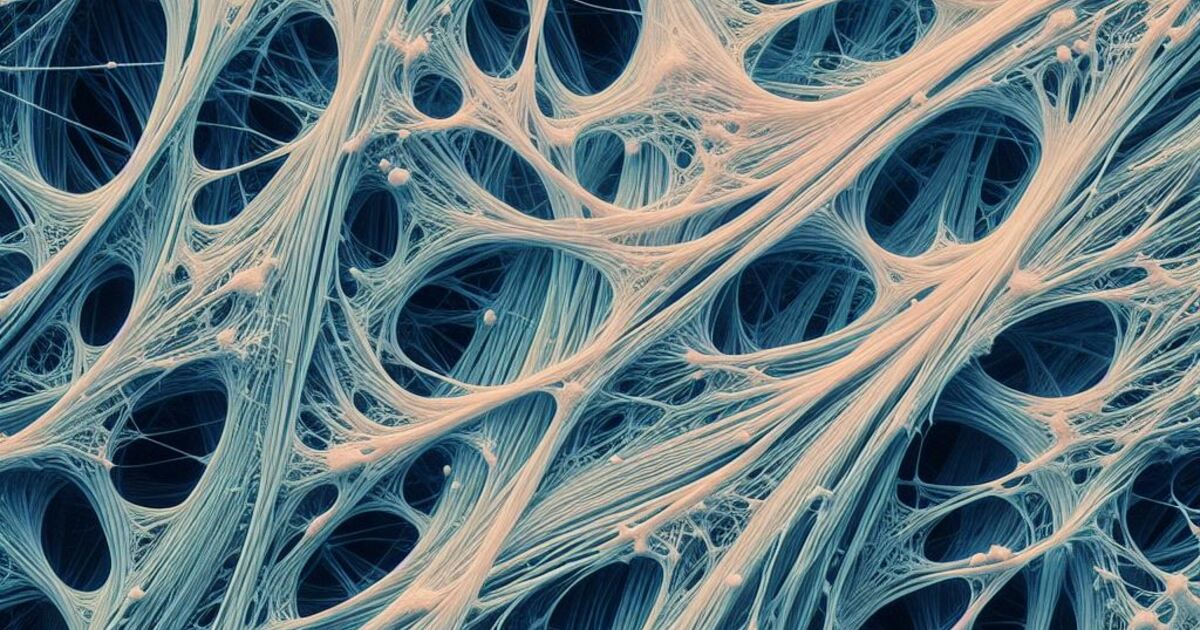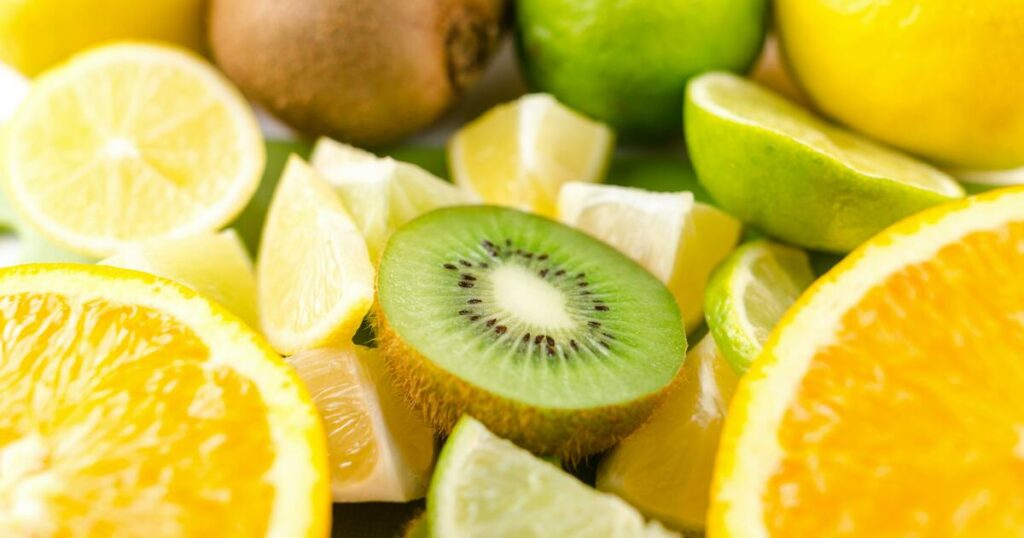The aging process is an intricate dance between genetics, lifestyle choices, and environmental influences, compelling us to seek ways to slow its pace. [1] The goal of anti-aging is to lessen the effects of aging.
Incorporating natural products such as quercetin, resveratrol, and curcumin, known for their anti-aging properties, into our diet can support a healthier, longer life [1]
To cater to this need, anti-aging supplements like collagen supplements, coenzyme Q10, and antioxidants like vitamin C have gained popularity for their potential to reduce the signs of aging and enhance metabolic health [3]
These supplements promise to not just care for your skin but also bolster overall wellbeing, offering a proactive approach to aging with grace [5]
1. Collagen

Overview
Collagen is the most abundant protein in our bodies and is responsible for providing structure to bones, skin and other connective tissues such as tendons and ligaments.
Collagen supplements, essential for skin health, come in various forms including pills and powders known as collagen hydrolysates. These supplements are directly absorbed by skin cells, enhancing skin hydration, elasticity, and reducing wrinkles [6]
Collagen’s role extends beyond skin care; it is vital for bone density, muscle mass, and overall anti-aging effects [7]
Additionally, collagen aids in joint pain relief and may improve conditions like osteoarthritis [8]
Key Anti-aging Benefits of Collagen Supplements
- Improves Skin Health: Enhances moisture, elasticity, and reduces roughness [6]
- Supports Bone and Muscle Health: Beneficial for bone density and muscle mass, especially in aging individuals [7]
- Joint Pain Relief: Helps in reducing discomfort associated with joint issues and osteoarthritis [8]
Dosages
Studies have used doses ranging from 2.5 to 10 grams daily.
Considerations and Collagen Side Effects
- Generally safe with rare reports of minor side effects such as indigestion or headaches
- Those on a plant-based diet should opt for vegan collagen options, as standard supplements are derived from animal products.
- Those with allergies to its sources should exercise caution when taking this supplement.
Collagen’s importance is underscored by its decrease with age, leading to visible aging signs like wrinkles and sagging skin [8]
Thus, supplementing with collagen can be a proactive approach to maintaining a youthful appearance and supporting overall health.
2. Coenzyme Q10 (CoQ10) Benefits

Overview of Coenzyme Q10 (CoQ10)
Coenzyme Q10, also known as ubiquinone or ubiquinol, is a vital lipophilic antioxidant synthesized by the human body and found in all cell membranes [15]
It plays a crucial role in the electron transport chain, transporting electrons and enhancing the enzymatic activities of superoxide dismutase and glutathione peroxidase [15]
As we age, the natural levels of CoQ10 decrease, which can lead to cell membrane damage and increased inflammation [15]
Key Anti-Aging Benefits of CoQ10
- Antioxidant Protection: CoQ10 stabilizes membranes and protects against lipid peroxidation [15]
- Anti-inflammatory Effects: Reduces inflammatory markers such as CRP, IL-6, and TNF-α, and decreases the activation of NF-κB cells [15]
- Supports Heart Health: Improves cardiac contractility and lipid profiles, potentially easing symptoms of heart failure [15]
- Neuroprotective Properties: Offers protection against neuro-inflammatory changes and supports mitochondrial function in various conditions, including peripheral neuropathy, Down syndrome and Alzheimer’s disease [15]
- Liver Health: Demonstrates hepatoprotective effects in conditions like non-alcoholic fatty liver disease by improving inflammation biomarkers [15]
CoQ10 and Skin Health
- Enhances Skin Quality: CoQ10 is integral in skin’s mitochondrial functions, helping to reduce signs of aging such as wrinkles and improving skin texture and hydration [12]
- Combats Environmental Damage: Effective in neutralizing harmful free radicals from UV exposure and and smoking [13]
- Synergistic Effects with Other Antioxidants: Works well with ingredients like retinol and vitamin C to enhance skin protection and repair [13]
Recommended Usage
- Topical Application: Applying CoQ10-enriched products like Protransf-CoQ10 Emulgel can directly boost skin’s antioxidant capacity [12]
- Dietary Sources and Supplements: Found in meat, fish, nuts, and certain oils, oral supplements of CoQ10 can also support overall health [13]
- Safety and Interactions: Generally safe, though it’s advisable to consult with healthcare providers before starting supplementation, especially if undergoing chemotherapy or taking specific medications [13]
Ubiquinone vs. Ubiquinol: A Comparative Analysis
Coenzyme Q10 (CoQ10) exists in two forms: ubiquinone and ubiquinol. Understanding the differences between these two forms is crucial for optimizing their use in anti-aging and health support.
Ubiquinone, also known as CoQ10, is the oxidized form of the molecule. It is the form most commonly found in dietary supplements and is essential for the mitochondrial electron transport chain, which generates ATP, the energy currency of the cell1. Ubiquinone is also a powerful antioxidant, protecting cells from oxidative damage2
Ubiquinol is the reduced form of CoQ10 and is considered the active form within the body. It has a unique role in cellular energy production and is more readily absorbed than ubiquinone3. Ubiquinol is also more effective at neutralizing free radicals, making it a potent antioxidant4.
The primary difference between ubiquinone and ubiquinol lies in their molecular structure and antioxidant capacity. Ubiquinol, with its extra electrons, is more efficient at donating electrons to neutralize free radicals, which is a key aspect of its antioxidant action3. This makes ubiquinol the preferred form for individuals looking for enhanced antioxidant benefits.
Recommended Dosages of CoQ10
Ubiquinone Dosing
When it comes to recommended doses, ubiquinone supplements typically range from 30 to 200 mg per day for general health maintenance5. For those looking to support athletic performance or counteract statin-related muscle pain, doses of 300 mg per day have been found to be effective5.
Ubiquinol Dosing
For ubiquinol, the commonly recommended daily dose for adults is between 100 and 200 mg. However, specific health conditions may require higher doses. For example, individuals taking statins or concerned about cellular energy production may be advised to take 200 mg of ubiquinol each day6.
CoQ10’s diverse benefits not only address aging but also offer protective effects against various age-related diseases, making it a valuable addition to anti-aging regimens.
3. Vitamin C

Overview of Vitamin C
Vitamin C acts as an antioxidant and is an essential nutrient that is important for the immune systeme and the synthesis of collagen. Vitamin C, a science-backed favorite among dermatologists, is crucial for skin health due to its powerful antioxidant properties [17]
It plays a significant role in combating free radicals from external sources like pollution and internal processes such as metabolism, which can accelerate aging [17]
Key Anti-Aging Benefits of Vitamin C for Skin Health
- Prevents Photoaging: Protects against damage from UV rays and helps reduce the signs of aging [2]
- Reduces Wrinkles and Improves Skin Texture: Continuous use can lead to visible improvements in skin appearance, including diminished wrinkles and enhanced texture [17]
- Fades Dark Spots: Effective in reducing hyperpigmentation by inhibiting melanin production [17]
- Acne Control: Its anti-inflammatory properties help manage acne by regulating sebum production [17]
More Benefits of Vitamin C
- Aids in wound healing
- Enhances iron absorption
Optimal Use and Formulations
- Effective Formulations: Look for serums containing L-ascorbic acid at concentrations of 10% to 20%, with a pH below 3.5 to ensure skin absorption and efficacy [17]
- Application Tips: Apply to clean skin in the morning followed by moisturizer and sunscreen to maximize benefits [17]
Dosages
The recommended dietary allowances ranges from 75 to 90 milligrams per day for adults.
Special Considerations
- Not for Children: Vitamin C usage is specifically studied and recommended for adults [17]
- Synergy with Vitamin E: Combining Vitamin C with Vitamin E enhances protective effects against oxidative damage [10]
Safety Considerations
Well-tolerated but high doses may cause gastrointestinal discomfort.
Product Recommendation
Eucerin Hyaluron-Filler Vitamin C Booster: This product features 10% pure L-ascorbic acid, complemented by hyaluronic acid and Licochalcone A, making it suitable for all skin types [18]
4. Omega-3 Fatty Acids

Anti-Aging Benefits of Omega-3 Fatty Acids
Omega-3 fatty acids, particularly EPA and DHA, are renowned for their anti-inflammatory properties and potential health benefits. Here is an overview of the specific advantages they offer:
- Cardiovascular Health: High levels of Omega-3 fatty acids can significantly reduce the risk of sudden cardiac death, with an Omega-3 Index of 8% or higher leading to a 90% reduction compared to a lower index [22]
- Cognitive Function: Adequate DHA levels are associated with a decreased risk of cognitive decline, Alzheimer’s disease, and other neurodegenerative disorders [21]
- Inflammation and Chronic Diseases: Their potent anti-inflammatory effects are beneficial in managing and mitigating risks associated with chronic diseases like cardiovascular disease, diabetes, cancer, and neurodegenerative disorders [21]
Clinical Findings and Research Insights
Despite their widespread acclaim, the effects of Omega-3 fatty acids have shown varying results across different studies:
- Lifespan and Aging: While fish oil has increased lifespan by over 40% in certain mouse strains, it did not affect the lifespan in other studies, indicating that benefits might be limited to specific genetic backgrounds [19]
- Disease Prevention: Omega-3 fatty acids have shown potential benefits in preventing or alleviating symptoms of stroke, depression, diabetes mellitus, cancer, and Alzheimer’s disease [19]
- Inconsistent Outcomes: Recent clinical trials have produced mixed results, with only a small fraction demonstrating clear benefits from Omega-3 supplementation [19]
Practical Recommendations for Omega-3 Intake
To maximize the benefits of Omega-3 fatty acids, consider the following:
- Dietary Sources: Incorporate foods rich in Omega-3s such as fish, nuts, and certain oils into your diet.
- Supplementation: For those unable to meet their Omega-3 needs through diet alone, supplements can be a practical option. However, the effectiveness can depend on factors like dosage, timing, and individual health status [20]
- Personalized Strategies: Ongoing research suggests that tailored approaches to Omega-3 supplementation could optimize benefits for specific conditions or populations [20]
Omega-3 fatty acids continue to be a key focus of nutritional research due to their significant health implications and potential to enhance longevity and quality of life.
5. Hyaluronic Acid

Overview of Hyaluronic Acid
Hyaluronic acid, a naturally occurring substance in the human body, is found in high concentrations in the skin, eyes, and joints. [23] It is renowned for its ability to retain moisture and enhance tissue hydration, making it a key ingredient in many anti-aging products. [23] [24]
Anti-Aging Benefits and Uses
- Skin Hydration and Wrinkle Reduction: Regular use of hyaluronic acid can significantly improve skin hydration and elasticity, thereby reducing the appearance of fine lines and wrinkles [3] [24]
- Joint Health: It acts as a cushion and lubricant in the joints, preventing painful rubbing between bones [23]
- Eye Health: Effective in treating dry eyes due to its excellent water retention properties [23]
- Wound Healing: Accelerates the healing process by regulating inflammation and directing blood flow to damaged tissues [24]
Forms and Sources
- Dietary Supplements and Topical Products: Available in forms such as pills, serums, and creams.
- Natural Sources: Produced by fermenting bacteria and extracted from rooster combs [23]
Safety and Considerations
- General Safety: Hyaluronic acid is safe for most people, with rare cases of adverse reactions [23] [24]
- Pregnancy and Nursing: While generally considered safe, it is advised to consult a healthcare provider before use during pregnancy or breastfeeding. [23]
- Medical Advice Recommended: Always consult with a healthcare professional before starting any new supplement regimen, especially for those with chronic health conditions or those taking prescription medications. [24]
Hyaluronic acid’s multifunctional properties not only help in maintaining youthful skin but also support overall bodily functions, making it a versatile component in anti-aging and health maintenance regimens.
6. Curcumin

Overview: Curcumin is the main active ingredient in turmeric, a spice that has been used for its medicinal properties for thousands of years. It’s known for its potent anti-inflammatory and antioxidant properties1.
Anti-Aging Benefits and Uses:
- Arthritis Symptom Relief: Curcumin helps reduce inflammation and joint pain1.
- Eye Health: It may benefit in managing inflammatory and degenerative eye disorders1.
- Kidney Health: Curcumin supports kidney health and healing of acute kidney injuries1.
- Hay Fever Relief: It can reduce seasonal allergy symptoms1.
Forms and Sources:
- Available in fresh or dried turmeric root, as well as in supplement form.
- Dosage can range from 500–2,000 mg per day2.
Safety Considerations:
- Generally safe with few side effects. High doses may cause digestive issues1.
7. Lutein


Overview: Lutein is a carotenoid found in various fruits and vegetables. It’s known for its role in eye health and is also a powerful antioxidant3.
Anti-aging Benefits and Uses:
- Eye Health: Lutein accumulates in the retina and protects against age-related macular degeneration3.
- Skin Benefits: May protect the skin from UV damage and improve skin hydration and elasticity3.
Forms and Sources:
- Found in leafy greens like kale and spinach, as well as in eggs and corn.
- Supplements typically contain 20 mg or more, but benefits have been shown at 6 mg per day410.
Safety Considerations:
- High doses may cause carotenemia, a harmless condition where the skin turns yellowish5.
8. Calcium

Overview: Calcium is the most abundant mineral in the body, essential for bone health and various bodily functions621.
Anti-Aging Benefits and Uses:
- Bone Health: Critical for building and maintaining strong bones and teeth.
- Muscle Function: Necessary for muscle movement and nerve messaging.
Forms and Sources:
- Found in dairy products, dark-green leafy vegetables, and fortified foods.
- Recommended dosage is 1,000 mg per day for most adults, and 1,200 mg for those over 70723.
Safety Considerations:
9. Vitamin D

Overview: Vitamin D, also known as the “sunshine vitamin,” is crucial for bone health and immune function826.
Anti-Aging Benefits and Uses:
- Bone Health: Helps the body absorb calcium.
- Immune Support: Plays a role in immune system health.
Forms and Sources:
- Produced by the body when exposed to sunlight; also found in fatty fish, egg yolks, and fortified foods.
- The recommended dietary allowance (RDA) is 600 IU for adults up to age 70, and 800 IU for older adults928.
Safety Considerations:
- Vitamin D toxicity can occur from high intakes, leading to hypercalcemia826.
- Highly recommend having your doctor check your Vitamin D levels before and during use.
10. B Vitamins

Overview: B vitamins are a group of water-soluble vitamins that are vital for metabolic processes, energy production, and maintaining healthy skin and brain function1011.
Anti-Aging Benefits and Uses:
- Energy Production: Help convert food into energy.
- Brain Health: Support the functioning of the nervous system.
Forms and Sources:
- Found in a variety of foods, including whole grains, meats, legumes, nuts, and dairy.
- Dosages vary for each B vitamin, but a B-complex supplement can help ensure adequate daily intake1011.
Safety Considerations:
- Generally safe, but high doses of certain B vitamins can cause adverse effects like nerve damage or gastrointestinal issues1011.
Anti-Aging and Supplements:
While aging is a natural process, certain supplements like curcumin, lutein, calcium, vitamin D, and B vitamins may support healthy aging and reduce the risk of age-related diseases. They work by protecting cells from damage, supporting bone health, and maintaining proper metabolic function. However, it’s important to consider the appropriate dosages and potential safety concerns associated with high intakes of these supplements. For optimal health, these supplements should be part of a balanced diet and healthy lifestyle1115.
FAQs
What is the top supplement to combat aging?
There is none. Supplements work in harmony with each other to achieve good health. It’s like saying water is more important than food. You need both to survive and so it is with supplements.
We require multiple supplement components to maintain a variety of bodily functions and systems, including maintaining healthy vision, supporting the immune system, managing inflammation, and promoting brain health, among others.
Which supplement is most effective for promoting a longer life?
For those seeking to enhance longevity and counteract aging, experts recommend several additional supplements:
- Benfotiamine
- Acetyl L-Carnitine
- Alpha Lipoic Acid
- NAD+ Booster
- Niacin, which is an essential B vitamin crucial for energy production and supports the nervous system, digestion, and skin health.
After reaching the age of 60, which vitamin is essential to prevent crepey skin?
The 10 vitamins listed in this article together are helpful to prevent crepey skin.

